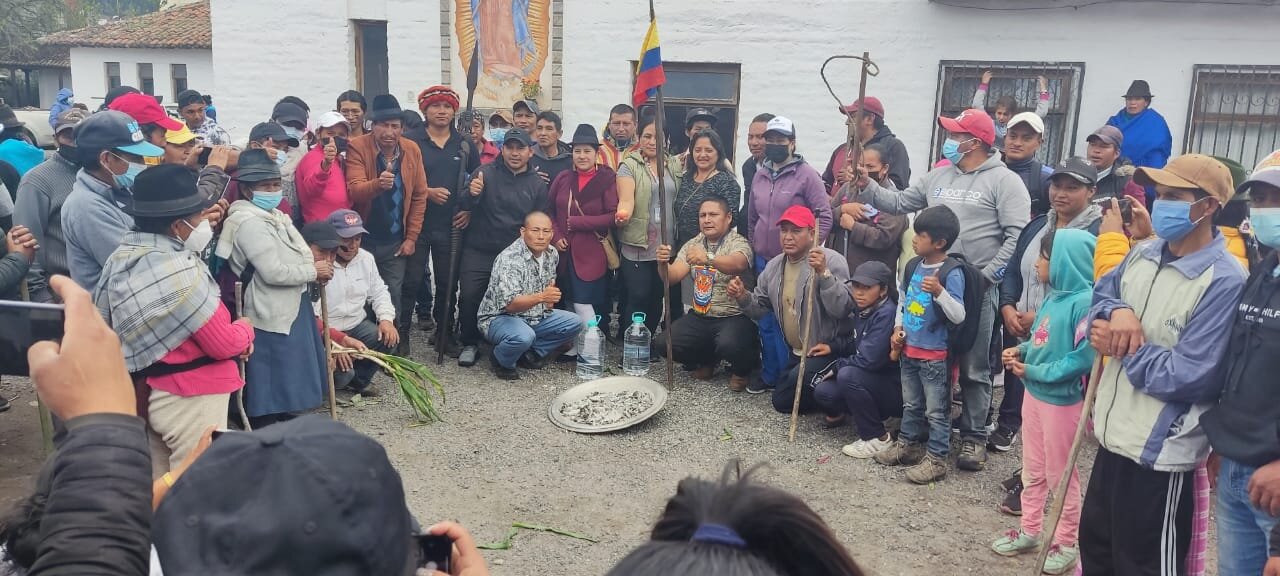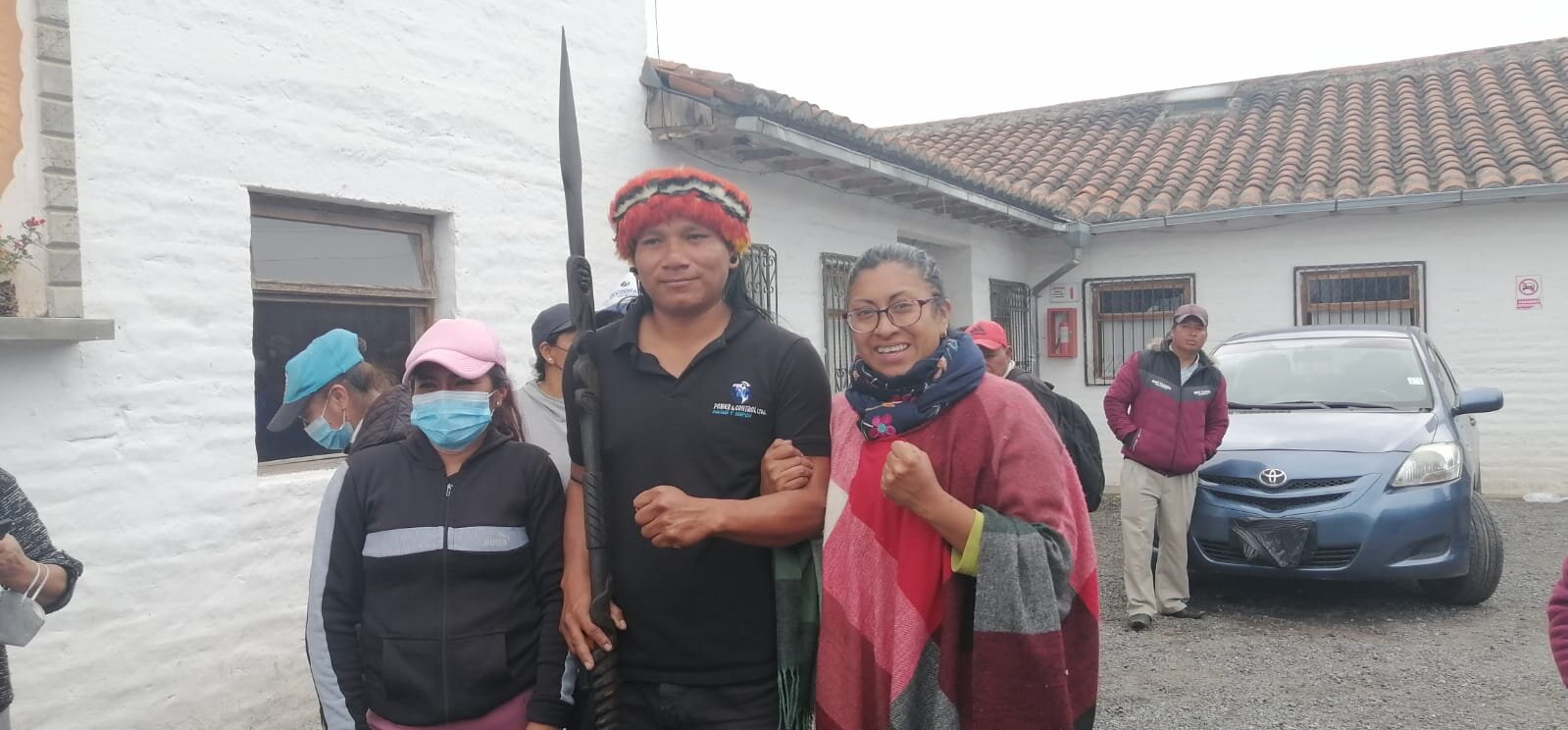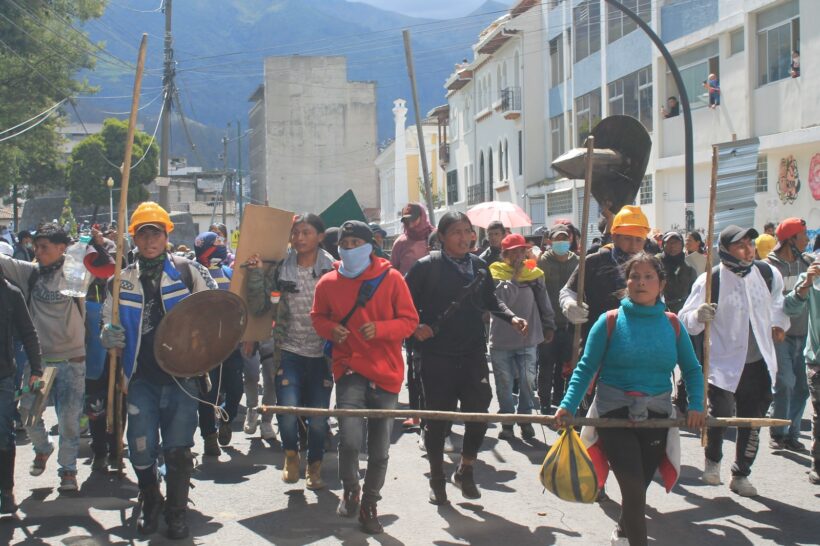Greetings, my name is Camilo Wajuyata. I am a young Shuar of 32 years of age from the indigenous community Chinimp (Palora, Ecuador) who is always in front of my people looking for any support in order to collaborate in the joint development of our Shuar culture.
What is Ecuador facing at the moment?
Our country, Ecuador, is currently facing an economic crisis which is affecting farmers and peasants. There is also a lack of medicine and education.
How would you describe the crisis?
The crisis in our country is already very noticeable because of the lack of work. Our brothers and sisters have migrated to other countries and the basic food basket provided by the State does not cover enough to be able to generate a dignified life in every home of different Ecuadorian brothers and sisters.
About the protests: What are the protests like and how are they characterised?
Our origin before the protests is to ask for the acceptance of our 10 petitions generated within the CONAIE (Confederation of Indigenous Nationalities of Ecuador) so that our population also has mutual benefits throughout our country.
What are the protests like?
The indigenous protests at a national level are peaceful and we have made ourselves heard from all parts of our Ecuadorian territory with the aim of being attended to our petitions. Unfortunately, however, we have been brutally attacked by this government with tear gas and some of our brothers and sisters have been arrested.
How are they characterised?
We have been characterised by this government as terrorists and drug traffickers just for defending our rights and maintaining our indigenous resistance at a national level. We are the indigenous communities Shuar, Achuar, Kichua of the Amazon, Huaorani, Cofan, Zapara. In the demonstrations we always carry our spears in order to give ourselves recognition but we are very saddened by this neoliberal government of President Guillermo Lasso which has called them weapons.
They are not weapons; they are our presentation of identification at national and international level.
How would you describe the different characteristics of the crisis in terms of causing violence towards the population of Ecuador?
The crisis in our country has affected a lot at a national level, which has generated violence in terms of labour exploitation in all areas where we are given work to be able to sustain our homes.

Image by Camilo Wajuyata
What kind of violence is the country exposed to?
To labour violence because many of the people are less well paid but because of necessity they have to expose themselves to forced labour in order to cover some of the needs in their homes.
Would you talk about different types of violence?
Yes, violence at work:
Within labour it is very notorious at national level how they exploit our brothers out of necessity.
Economic violence:
On the economic side they are paid very little in their work.
Child violence:
It is a pity that our children, who could be in school, are seen working.
And how are people from different social/economic backgrounds affected?
Socially it is clear that our society is the most affected because they have their small businesses and their economy is very complicated because they have to cover some debts to be able to maintain their income.
What is your personal situation like?
My personal situation has been very complicated because my work is in the countryside and in this sector, we have been very affected. But we are still there in the ongoing struggle to get out of this national crisis.
What has changed in everyday life?
Apparently, nothing because we are always going back to the same thing: a lot of injustice at the national level and a big drop in the sale of our products.
How do people react and act collectively?
The way our people act is to always hope for a general change in every sense, because our country has been hit in every area.
That is why we have to continue to maintain our idea that our products can be exported to other countries in the world.
Can the community be a force in such a situation?
No, because many upper class people do not agree with the demands of the lower class. That is why the one who always stands up for the rights and obligations that our country is exposed to are the indigenous people of our country.
What is your personal source of hope in such a violent time?
The only hope I have maintained is to ask all the leaders, and leaders of different peoples and nationalities to maintain our position of petition to be listened to and attended to in a proper and responsible manner.
For them I always say that the people save the people.
Are there rays of hope?
Yes, there are rays of hope, but for that we must elect a president who has felt the reality of many needs. We are waiting to elect a president who is aware of all the Ecuadorian people, that is why we want to elect our maximum indigenous leader Leonidas Iza, a man who has always watched over the social classes of our population.

Photo by Charly Wajuyata












